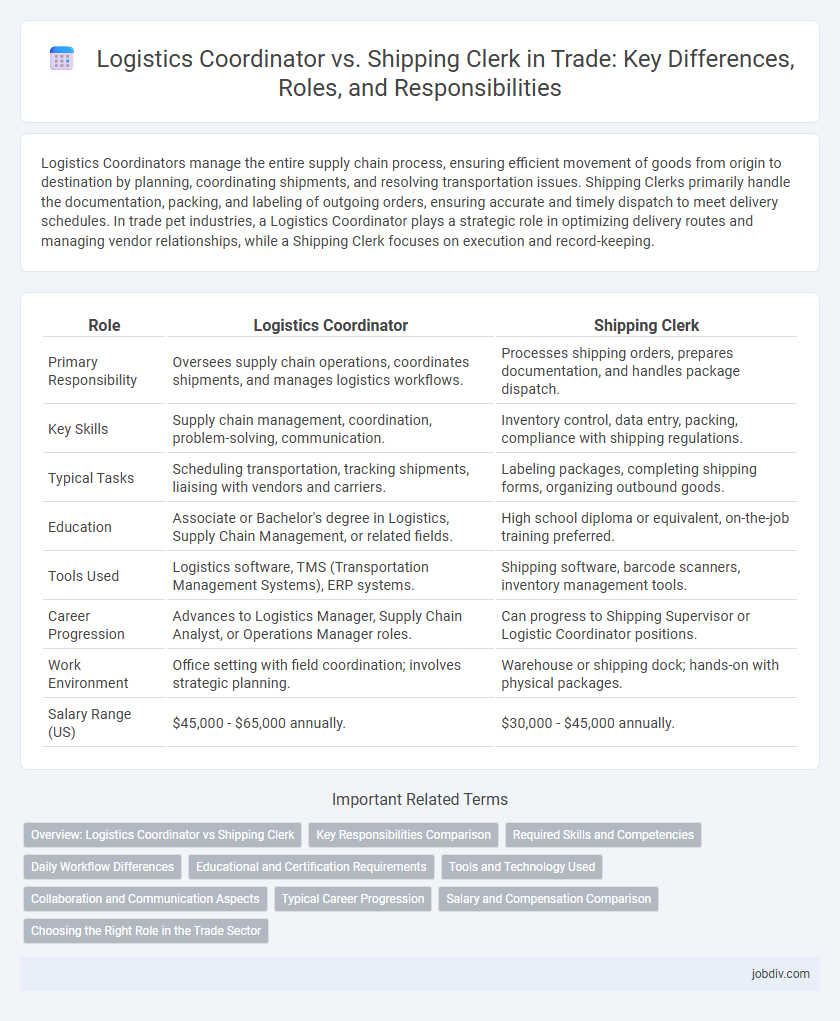Logistics Coordinators manage the entire supply chain process, ensuring efficient movement of goods from origin to destination by planning, coordinating shipments, and resolving transportation issues. Shipping Clerks primarily handle the documentation, packing, and labeling of outgoing orders, ensuring accurate and timely dispatch to meet delivery schedules. In trade pet industries, a Logistics Coordinator plays a strategic role in optimizing delivery routes and managing vendor relationships, while a Shipping Clerk focuses on execution and record-keeping.
Table of Comparison
| Role | Logistics Coordinator | Shipping Clerk |
|---|---|---|
| Primary Responsibility | Oversees supply chain operations, coordinates shipments, and manages logistics workflows. | Processes shipping orders, prepares documentation, and handles package dispatch. |
| Key Skills | Supply chain management, coordination, problem-solving, communication. | Inventory control, data entry, packing, compliance with shipping regulations. |
| Typical Tasks | Scheduling transportation, tracking shipments, liaising with vendors and carriers. | Labeling packages, completing shipping forms, organizing outbound goods. |
| Education | Associate or Bachelor's degree in Logistics, Supply Chain Management, or related fields. | High school diploma or equivalent, on-the-job training preferred. |
| Tools Used | Logistics software, TMS (Transportation Management Systems), ERP systems. | Shipping software, barcode scanners, inventory management tools. |
| Career Progression | Advances to Logistics Manager, Supply Chain Analyst, or Operations Manager roles. | Can progress to Shipping Supervisor or Logistic Coordinator positions. |
| Work Environment | Office setting with field coordination; involves strategic planning. | Warehouse or shipping dock; hands-on with physical packages. |
| Salary Range (US) | $45,000 - $65,000 annually. | $30,000 - $45,000 annually. |
Overview: Logistics Coordinator vs Shipping Clerk
Logistics Coordinators oversee the entire supply chain process, managing inventory, transportation, and warehouse operations to ensure timely delivery and cost efficiency. Shipping Clerks focus on the preparation and documentation of shipments, including packing, labeling, and coordinating with carriers to dispatch goods accurately. Both roles are essential for smooth trade operations, but Logistics Coordinators hold a broader strategic responsibility while Shipping Clerks handle detailed execution tasks.
Key Responsibilities Comparison
Logistics Coordinators manage the entire supply chain, overseeing shipment scheduling, inventory control, and communication with carriers to ensure timely delivery. Shipping Clerks primarily handle the preparation and documentation of outgoing shipments, including labeling, packaging, and verifying order accuracy. The Logistics Coordinator's role is broader, involving strategic planning and coordination, whereas the Shipping Clerk focuses on operational tasks within the shipping department.
Required Skills and Competencies
A Logistics Coordinator requires strong organizational skills, proficiency in supply chain management software, and the ability to oversee complex transportation schedules to optimize delivery efficiency. Shipping Clerks need attention to detail, data entry accuracy, and knowledge of shipping documentation to ensure proper packaging, labeling, and timely dispatch of goods. Both roles demand effective communication skills and a solid understanding of inventory control and compliance regulations within the logistics and trade industry.
Daily Workflow Differences
Logistics Coordinators manage the entire supply chain workflow, including planning, scheduling shipments, and coordinating with carriers to ensure timely delivery, while Shipping Clerks primarily handle the documentation, labeling, and physical dispatch of goods. Coordinators use advanced software systems for route optimization and inventory tracking, optimizing efficiency across multiple shipments each day. Shipping Clerks focus on package preparation, verifying orders, and maintaining shipping records, emphasizing accuracy in daily tasks rather than strategic planning.
Educational and Certification Requirements
Logistics Coordinators typically hold a bachelor's degree in supply chain management, business administration, or logistics, with certifications like APICS CPIM or CSCMP SCPro enhancing career prospects. Shipping Clerks often require a high school diploma or equivalent, with on-the-job training and optional certifications such as the Certified Shipping and Receiving Professional (CSRP) to develop expertise. Higher education and specialized certifications for Logistics Coordinators emphasize strategic planning and supply chain optimization, whereas Shipping Clerks focus on operational accuracy and documentation compliance.
Tools and Technology Used
Logistics Coordinators utilize advanced supply chain management software such as SAP, Oracle SCM, and transportation management systems (TMS) to optimize routing, inventory, and order processing. Shipping Clerks primarily rely on shipping documentation tools, barcode scanners, and basic warehouse management systems (WMS) to track shipments and verify order accuracy. Both roles increasingly integrate automation technologies and real-time tracking platforms to enhance operational efficiency and shipment visibility.
Collaboration and Communication Aspects
Logistics coordinators and shipping clerks both play crucial roles in trade by ensuring efficient shipment processes through seamless collaboration and communication. Logistics coordinators oversee the entire supply chain, coordinating between suppliers, carriers, and warehouse teams to streamline operations and resolve issues promptly. Shipping clerks maintain accurate shipment records and communicate closely with logistics personnel and carriers to track orders and manage delivery schedules effectively.
Typical Career Progression
Logistics Coordinators typically advance to roles such as Supply Chain Manager or Operations Manager by gaining experience in coordinating complex shipments and optimizing transportation processes. Shipping Clerks often progress to Logistics Coordinator positions after acquiring expertise in inventory management and documentation accuracy. Both career paths emphasize increasing responsibility in managing logistics workflows and improving supply chain efficiency.
Salary and Compensation Comparison
Logistics Coordinators typically earn higher salaries than Shipping Clerks, with average annual compensation ranging from $50,000 to $65,000 compared to $30,000 to $45,000. The increased salary for Logistics Coordinators reflects their broader scope of responsibilities, including supply chain management and coordination of logistics operations. Shipping Clerks often receive lower base pay but may benefit from overtime and hourly wage increases tied to handling shipments and inventory management.
Choosing the Right Role in the Trade Sector
Logistics Coordinators oversee supply chain management, ensuring efficient distribution and inventory control, while Shipping Clerks handle documentation, packaging, and shipment tracking. Selecting the right role depends on whether you prefer strategic planning and coordination or detailed administrative tasks in trade operations. Companies like DHL and Maersk value Logistics Coordinators for their problem-solving skills and Shipping Clerks for accuracy in handling freight documentation.
Logistics Coordinator vs Shipping Clerk Infographic

 jobdiv.com
jobdiv.com